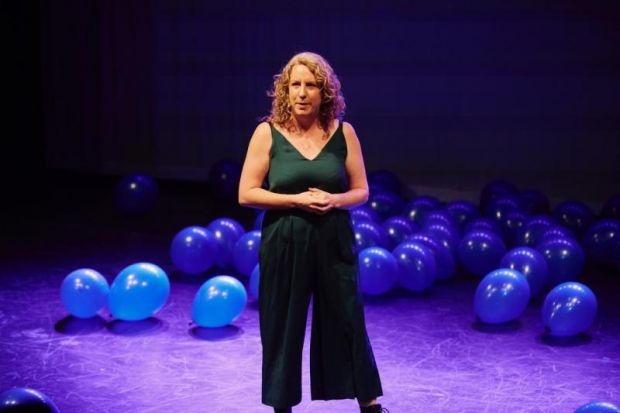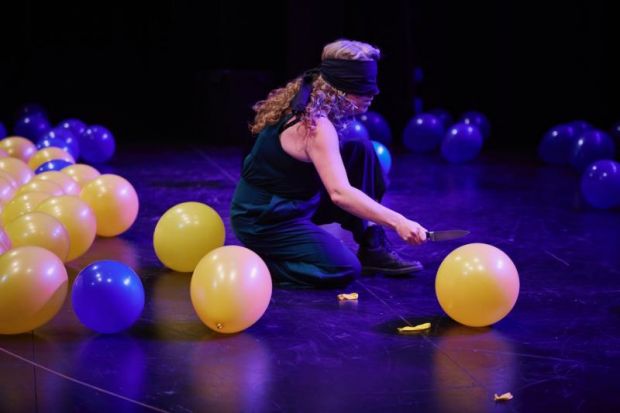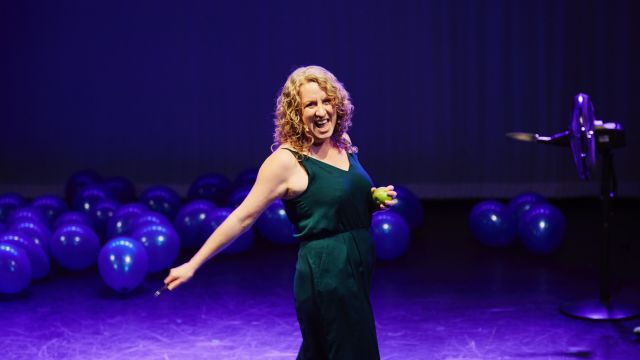Waterloo
A little remote control toy tank, a red ballon on a string attached to its gun turret, weaves through a sea of blue balloons. This tank, moving in random circles, generates a kind of tension. We expect the tank to burst the balloons. It doesn’t. That comes later... And then Bron Batten strolls onto the stage.
She talks directly to us as if we’re old mates with an unassuming, undramatic conversational style, laced with dry and self-deprecating irony. In a sort of vaguely military colour jump suit (every detail in this show is consciously chosen and knowing) and black boots, she tells the story of her extended love affair with a Thatcher-voting, high-ranking, decorated UK army officer who, by his own admission, had killed many people.
 Is it a case of opposites attract? Possibly, but it’s more complicated, deeper and more ambivalent than that. The quality of their lovemaking is suggested by variations on a running gag which goes, ‘He had a very big... (pause)... house in the country.’ But certainly satisfying needs enough in its own way for the affair to continue intermittently for quite some time... Bron puzzles over this – and invites us to puzzle over it too.
Is it a case of opposites attract? Possibly, but it’s more complicated, deeper and more ambivalent than that. The quality of their lovemaking is suggested by variations on a running gag which goes, ‘He had a very big... (pause)... house in the country.’ But certainly satisfying needs enough in its own way for the affair to continue intermittently for quite some time... Bron puzzles over this – and invites us to puzzle over it too.
Is there, was there, an attraction fuelled by its very unlikelihood? That is, a free-living, leftie artist and a professional soldier who met by chance. Was the fact that he had killed many people – in the course of his duty, of course – an extra buzz? The buzz? We can only guess at his side of things; was it simply for him that Bron is just a lovely person – and a lot of fun - and when they were together, their differences could be – well, most of the time – put aside? Or was she a bit more than a bit on the side?
Her story is in fact the spine of the show - despite being interrupted or punctuated or illustrated by stuff that might look like colourful or anarchic fun but are also metaphors and reflections on the real-life story.
We are treated to a video of Bron, her ‘outside eye’ director Gary Abrahams and other grown-ups playing silly bugger war games with paint guns out in the bush somewhere – it’s noisy, chaotic and surprisingly painful. There’s other stuff like a blind folded Bron with a knife dealing with the balloons. (More tension.) There’s audience participation, with even more balloons – yellow and blue – and a ten-point questionnaire that asks light-hearted but actually very serious questions about killing and dying – including ‘Do you enjoy philosophical discussions – yes or no?’

We fill these questionnaires out and they are collected and the answers tallied; the results are announced on screen at the end of the show. The proportion of the audience who would, say, kill for their country or die for a loved one will differ with each performance, but the results are revealing all the same.
So, why Waterloo? A famous battle, a famous defeat – for Napoleon and the French anyway, albeit with a total, on both sides, let’s remember, of forty-seven thousand casualties. Again, war and violence and death.
In the words of the Abba song, Napoleon did surrender... And I have met my destiny in quite a similar way... But who surrendered here?

Despite outbursts of noise, a violent assault on the blue and yellow balloons (a sly reference in a show filled with sly references), an explosion, hundreds of coloured ping pong balls, the projection of text messages between the lovers, and that video of adults playing war games to which we return, Waterloo is actually a rather quiet, contemplative piece that raises confronting issues and important questions.
Are we attracted to violence – or death? (Freud thought so.) What is love anyway? What continues it and what ends it? Beneath the jokes and the (casual but calculated) fun and the colour and movement, these are questions worth asking – unless you are in that proportion of the audience that does not enjoy philosophical discussion...
Michael Brindley
Photographer: Lucy Parakhina
Subscribe to our E-Newsletter, buy our latest print edition or find a Performing Arts book at Book Nook.

